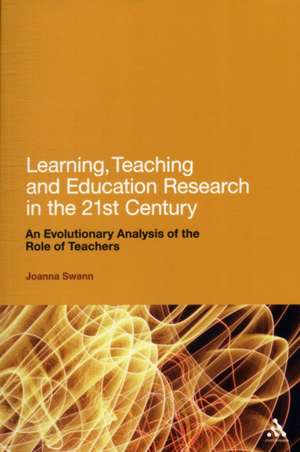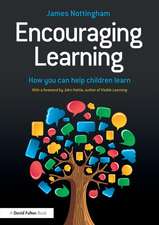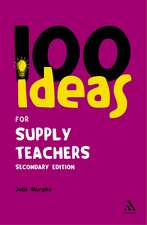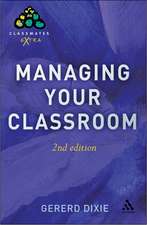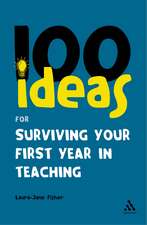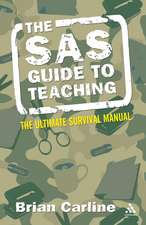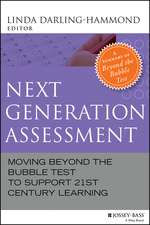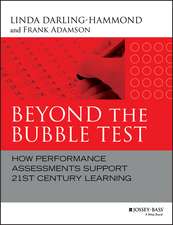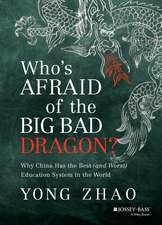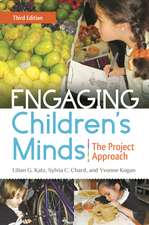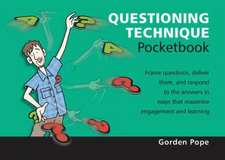Learning, Teaching and Education Research in the 21st Century: An Evolutionary Analysis of the Role of Teachers
Autor Dr Joanna Swannen Limba Engleză Paperback – 14 dec 2011
| Toate formatele și edițiile | Preț | Express |
|---|---|---|
| Paperback (1) | 306.17 lei 6-8 săpt. | |
| Bloomsbury Publishing – 14 dec 2011 | 306.17 lei 6-8 săpt. | |
| Hardback (1) | 1066.72 lei 6-8 săpt. | |
| Bloomsbury Academic – 31 ian 2012 | 1066.72 lei 6-8 săpt. |
Preț: 306.17 lei
Nou
Puncte Express: 459
Preț estimativ în valută:
58.58€ • 61.34$ • 48.59£
58.58€ • 61.34$ • 48.59£
Carte tipărită la comandă
Livrare economică 10-24 aprilie
Preluare comenzi: 021 569.72.76
Specificații
ISBN-13: 9781441163172
ISBN-10: 1441163174
Pagini: 288
Ilustrații: figures
Dimensiuni: 156 x 234 x 18 mm
Greutate: 0.42 kg
Editura: Bloomsbury Publishing
Colecția Continuum
Locul publicării:London, United Kingdom
ISBN-10: 1441163174
Pagini: 288
Ilustrații: figures
Dimensiuni: 156 x 234 x 18 mm
Greutate: 0.42 kg
Editura: Bloomsbury Publishing
Colecția Continuum
Locul publicării:London, United Kingdom
Caracteristici
Outlines tested alternative teaching and learning approaches to encourage students to develop creativity and criticality.
Notă biografică
Joanna Swann is a Popperian philosopher of learning and method, known internationally for her innovative theoretical and practical explorations of the implications of evolutionary epistemology for teaching and education research. Formerly a Principal Lecturer at the University of Brighton, UK, she is now a freelance author.
Cuprins
Acknowledgements \ 1. The Purpose of this Book \ Part I: Learning \ 2. The Challenge of an Evolutionary Analysis of Learning \ 3. What Happens When We Learn \ 4. Addressing Some Problematic Ideas About Learning \ Part II: Encouraging Learning \ 5. What Promotes and What Inhibits Learning \ 6. Against the Intensive Use of Prescribed Curricula with Children and Adolescents \ 7. Developing Student-Initiated Curricula \ Part III: Developing Teaching \ 8. Research and the Development of Teaching \ 9. Developing a Popperian Science of School Teaching \ 10. Improving Our Practices as Teachers \ 11. Teaching for a Better World \ References \ Index
Recenzii
'Learning, Teaching and Education Research in the 21st Century provides an outstanding vision for curriculum leadership and a much needed theoretical road map about how people learn. This book offers the quintessence of the best of Swann's thinking and her 37 years experience. It will no doubt be regarded as one of the most thoughtful curriculum texts in education. I am thrilled to see Dr. Swann's ideas now available in this thoughtful and organized text.' Caroline R. Pryor, Associate Professor in the Department of Curriculum and Instruction, Southern Illinois University Edwardsville, USA
'This is a most important book developing key and radical ideas about the nature of learning. Given the concern about standards of education in many countries today, anyone concerned with education should consider the challenges it presents to the philosophical basis of much education policy and practice.' John Pratt, Emeritus Professor, Centre for Institutional Studies, University of East London, UK
'Joanna Swann's book develops and applies the epistemology of Karl Popper to the world of education. It is both a starting point for new students and the most advanced treatment of educational theory and practice from a sound epistemological point of view.' Jean-Pierre Delage, Professor, University of Quebec at Rimouski, Canada
Joanna Swann recorded an interview for Radio Free Brighton, on the programme 'Learning Matters' with Professor Ian Cunningham.
'This is a book that I will share with teachers, academic colleagues and those closest to me who love philosophy or democracy or learning or who just want a fair and open world. The writing style is beautiful and outstanding. Joanna has a unique gift as an academic - she writes in a way that engages rather than alienates.' Eileen Piggot-Irvine, Associate Professor and Director of New Zealand Action Research and Review Centre, Unitec, New Zealand
'In addition to, and as a consequence of his revolutionary philosophy of science Karl Popper developed a new theory of evolutionary learning. Popper's basic idea is quite simple: all humans learn by trial and error activity. But taken seriously this idea challenges a great deal in established pedagogy; this pedagogy presumes that learning occurs through passive reception of information. As an experienced teacher with a clear style Joanna Swann accurately and thoroughly traces the wide-ranging consequences for teaching and learning of Popper's theoretical innovation. She offers thereby strategies which may be of great benefit for both teachers and learners, regardless of their age.' John Wettersten, Adjunct Professor for the Philosophy of Science, University of Mannheim, Germany
'Schools are pressured places these days, for teachers as much as for students. But we practitioners mustn't let that pressure prevent us from applying a constant and rigorous critique to our practice, relating it to our own professional and our schools' institutional philosophies. If we stop thinking about what we're doing, we teachers, our schools and our pupils are diminished. This book is a vital reminder of that fact, and a wake-up call to those of us at risk of forgetting it.' Bernard Trafford, Headmaster, the Royal Grammar School, Newcastle upon Tyne, UK
'This is a most important book developing key and radical ideas about the nature of learning. Given the concern about standards of education in many countries today, anyone concerned with education should consider the challenges it presents to the philosophical basis of much education policy and practice.' John Pratt, Emeritus Professor, Centre for Institutional Studies, University of East London, UK
'Joanna Swann's book develops and applies the epistemology of Karl Popper to the world of education. It is both a starting point for new students and the most advanced treatment of educational theory and practice from a sound epistemological point of view.' Jean-Pierre Delage, Professor, University of Quebec at Rimouski, Canada
Joanna Swann recorded an interview for Radio Free Brighton, on the programme 'Learning Matters' with Professor Ian Cunningham.
'This is a book that I will share with teachers, academic colleagues and those closest to me who love philosophy or democracy or learning or who just want a fair and open world. The writing style is beautiful and outstanding. Joanna has a unique gift as an academic - she writes in a way that engages rather than alienates.' Eileen Piggot-Irvine, Associate Professor and Director of New Zealand Action Research and Review Centre, Unitec, New Zealand
'In addition to, and as a consequence of his revolutionary philosophy of science Karl Popper developed a new theory of evolutionary learning. Popper's basic idea is quite simple: all humans learn by trial and error activity. But taken seriously this idea challenges a great deal in established pedagogy; this pedagogy presumes that learning occurs through passive reception of information. As an experienced teacher with a clear style Joanna Swann accurately and thoroughly traces the wide-ranging consequences for teaching and learning of Popper's theoretical innovation. She offers thereby strategies which may be of great benefit for both teachers and learners, regardless of their age.' John Wettersten, Adjunct Professor for the Philosophy of Science, University of Mannheim, Germany
'Schools are pressured places these days, for teachers as much as for students. But we practitioners mustn't let that pressure prevent us from applying a constant and rigorous critique to our practice, relating it to our own professional and our schools' institutional philosophies. If we stop thinking about what we're doing, we teachers, our schools and our pupils are diminished. This book is a vital reminder of that fact, and a wake-up call to those of us at risk of forgetting it.' Bernard Trafford, Headmaster, the Royal Grammar School, Newcastle upon Tyne, UK
